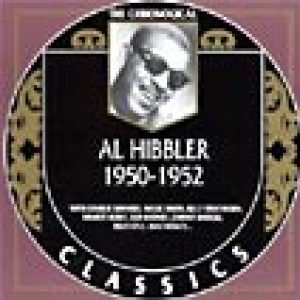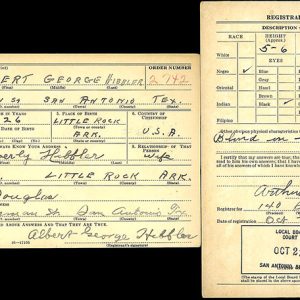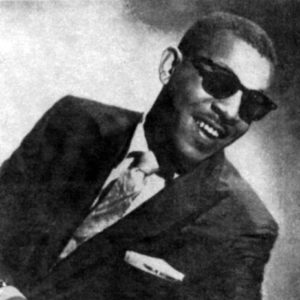calsfoundation@cals.org
Al Hibbler (1915–2001)
aka: Albert George Edward Hibbler
Albert George Edward (Al) Hibbler, a pop/jazz singer, was the first African American to have a radio program in Little Rock (Pulaski County). He was also the first blind entertainer to gain national prominence. He sang with the Duke Ellington Band for eight and a half years before he left to make five recordings as a solo artist; three became Billboard pop hits. Hibbler also became a prominent figure in the civil rights movement.
Records are inconsistent about Al Hibbler’s early life. Most sources have him born on August 16, 1915, in Como, Mississippi, to Hubert Hibbler and Lucy Prokes Hibbler, a farm family; some sources have reported that Hibbler was born in Tyro, Mississippi, while still others report he was born in Little Rock, but he always claimed Como as his birthplace. In addition, the family reportedly moved to Arkansas from Mississippi in 1925, settling in Dell (Mississippi County). However, the 1930 census records the family living in Mississippi, and while that same census gives Hibbler’s birthplace as Mississippi, a World War II draft card, filed in 1940, lists his birthplace as Little Rock. Finally, later Social Security records list his year of birth as 1914. According to family members, he had four brothers and one sister. Some reports claim that he was blind at birth, but others claim that he became blind at a young age. Hibbler’s brother Hubert Jr. was also blind.
In 1929, Hibbler’s parents sent him to be educated at the Arkansas School for the Blind in Little Rock. Hibbler was a soprano in the school choir and developed into a baritone with perfect pitch.
Hibbler was the first black singer to have a radio program in Little Rock (1935–1936). He broadcast on the KGHI 7:45 p.m. daily program, whistling and singing his theme song, “Star Dust,” to the accompaniment of Vivian Sparks on piano. In the 1930s, Hibbler sang with a number of bands from the East Coast when they came to Little Rock and performed at the Dreamland Ballroom on 9th Street. Hibbler got his first singing job with a band called the Yellow Jackets in 1935; they frequently performed at the Chat & Chew on 9th and State streets. In about 1935, he first sang with the Duke Ellington Band. Ellington told Hibbler, “If you ever make it to New York, come see me.”
Hibbler met Dub Jenkins & His Playmates of Memphis, Tennessee, when they played a tour date in Little Rock. He left Little Rock with them in 1936 and stayed with them a year and a half. He then spent two years with Boots and His Buddies out of San Antonio, Texas, but left in 1942.
Hibbler never used a cane, so a band took on extra responsibility when he worked with them. When he auditioned for Jay McShann’s band out of Kansas City, Missouri, jazz great Charlie Parker told McShann that he would quit if McShann failed to hire Hibbler. McShann replied, “Ok, I’ll hire him, but you’ll have to look after him.” In July 1942, Hibbler made his recording debut with McShann’s band in New York City. Hibbler quit McShann’s band after a year, recalling later that he “bummed around New York City for a while.”
In 1943, eight years after he met Ellington in Little Rock, Hibbler went to visit him at the Hurricane Club in New York and worked for him for eight and a half years. Ellington described Hibbler’s style as “tonal pantomime.” Ellington asked Bob Russell to write words to a tune he had previously written and titled, “Concerto for Cootie.” The new title, “Do Nothin’ Till You Hear from Me” (1943), had special meaning for Hibbler and Ellington, and they recorded it several times over the years. In 1947, Hibbler recorded, with Ellington’s band, the song, “Don’t Be So Mean to Me, Baby,” written by Peggy Lee and Dave Barbour. That same year, he was presented with the Esquire New Star Award for Male Singer. In all, Hibbler made eighty-two recordings with the Duke Ellington Band before he left over a salary dispute and started a solo career in 1951.
In 1955, Hibbler bought a house in Teaneck, New Jersey, with money he earned from his Billboard pop hit, “Unchained Melody.” By 1956, he had earned enough money from his second solo Billboard pop hit, “He,” to finish paying off the house. His other solo Billboard pop hits were “After the Lights Go Down Low” (1956), “11th Hour Melody” (1956), and “Never Turn Back (1956).
Hibbler’s version of “Unchained Melody” was the featured song in the movie Unchained (1955). In 1957, he sang the title song in the movie Nightfall. He also appeared occasionally on television, such as on the Steve Allen Show, in the 1950s through the 1970s.
Hibbler played a noteworthy role in the civil rights movement, marching with Martin Luther King Jr. and being arrested for civil disobedience in New Jersey in 1959 and in Birmingham, Alabama, on April 10, 1963, where he was picketing in front of the Trailways Bus Station. The police did not put Hibbler in jail but rather took him back to his hotel.
Record companies were reportedly concerned about how Hibbler’s involvement in the civil rights movement would affect record sales, and his singing career waned during this time. Frank Sinatra, however, signed Hibbler as one of his first solo artists on Sinatra’s Reprise label. Sinatra called Hibbler and Ray Charles his “two ace pilots.”
Hibbler was married three times. He had a son, Albert Jr., by his first wife and a daughter, Malaurie, by his second wife.
Hibbler played himself in the movie Texas Tenor: The Illinois Jacquet Story (1992). He lived his last few years in Chicago, Illinois, where his mother and siblings moved after leaving Arkansas. He died on April 24, 2001, in Holy Cross Hospital in Chicago. He is buried at the Chicago-area Lincoln Cemetery in Worth Township, Illinois.
For additional information:
“Al Hibbler.” Arkansas Jazz Heritage Foundation. https://www.arjazz.org/artists/hof/1995/95_al_hibbler.shtml (accessed August 19, 2023).
Hill, Jack W. “Blind Singer Sets Benefit.” Arkansas Democrat, May 9, 1986, p. 4W.
McCarthy, Albert. Big Band Jazz. New York: Bookthrift Co., 1984.
Ratliff, Ben. “Al Hibbler, a Singer with Ellington’s Band, Dies at 85.” New York Times, April 27, 2001. Online at http://www.nytimes.com/2001/04/27/arts/al-hibbler-a-singer-with-ellington-s-band-dies-at-85.html (accessed August 19, 2023).
Billie J. Abbott
Cabot, Arkansas
 "I Won't Tell a Soul I Love You," Performed by Al Hibbler
"I Won't Tell a Soul I Love You," Performed by Al Hibbler  Hibbler Draft Card
Hibbler Draft Card  Al Hibbler
Al Hibbler 




I am the niece of Albert “Al” Hibbler. I am the daughter of his brother Clyde Hibbler. Their birthplace was Senatobia, Mississippi, and they later moved to Little Rock, Arkansas. Both of my uncles, Al Hibbler and Hubert (Babe) Hibbler, were blind from birth. Albert never had eyesight. He fooled many with his sharp senses. One of his brothers (Clyde) played Negro League Baseball. Another brother, John M. Hibbler, was a CBS news photographer. He was laid to rest in Chicago, Illinois.